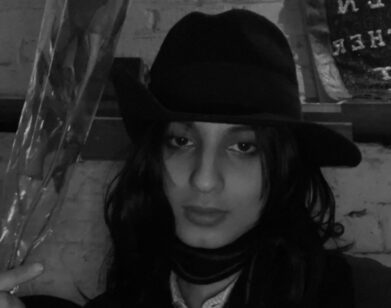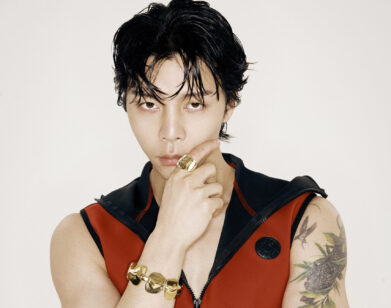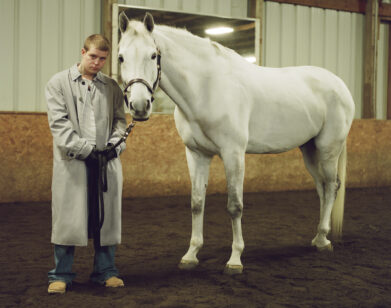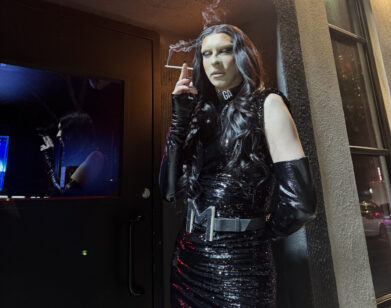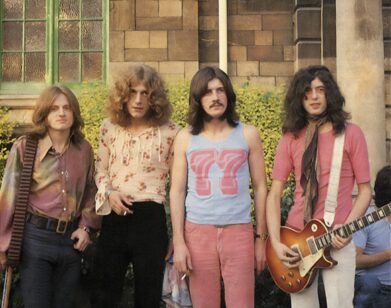Three Cheers for Rah Rah
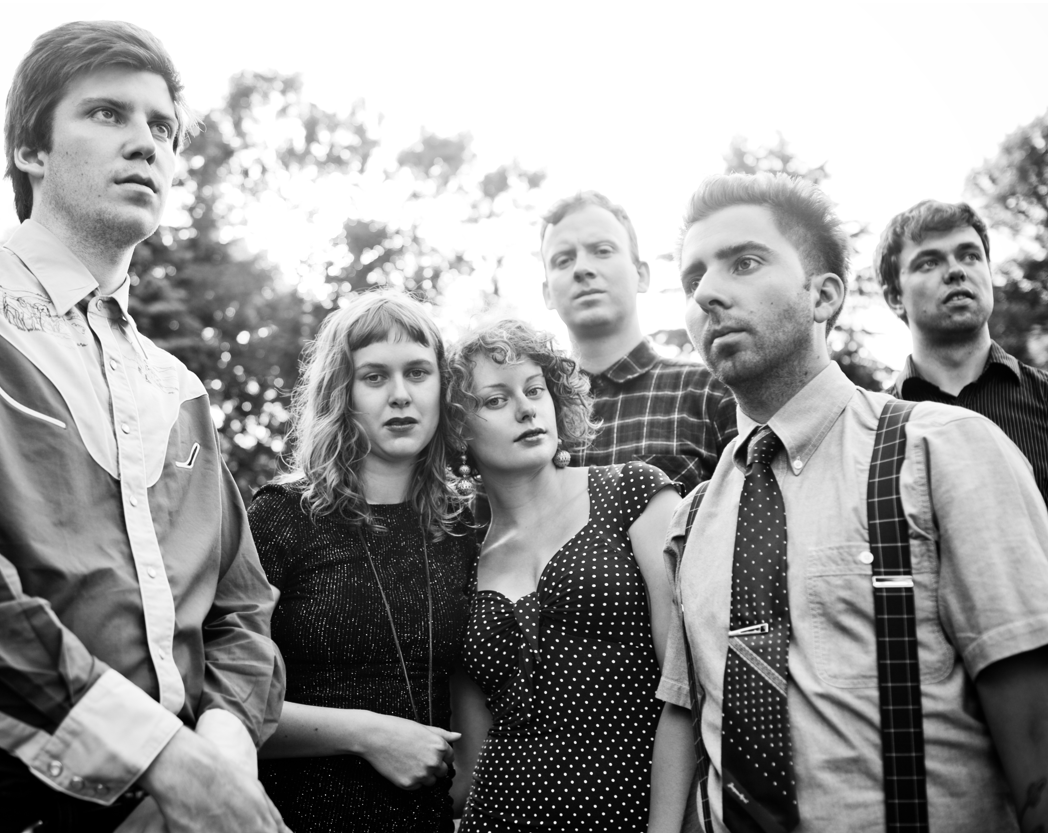
ABOVE: RAH RAH. IMAGE COURTESY OF VANESSA HEINS
In the high school cafeteria of indie rock, Canadian sextet Rah Rah would sit at the band-geek table. Their early songs are tuneful and literate but also dense—building layer upon layer of keyboards and guitars and strings, climaxing in massive epiphanies of sound.
The bookish art-school quality of their music remains intact on their third album, The Poet’s Dead, which finds the band reflecting on the grueling ups and downs of touring life, romanticizing about the American Dream of domestic bliss. But from a musical standpoint, The Poet’s Dead finds the band at its most playful and infectious, poised for an international breakout. Utilizing the skills of producers Gus Van Go and Werner F, their new songs are brighter and leaner, glowing with studio clarity and a hook-first approach to song structure.

RYAN REED: The Poet’s Dead is sort of being hyped as your “breakout” album. Do you guys feel that way?
ERIN PASSMORE: It’s a lot more polished than our previous records, and it kinda feels like a coming-out in general, especially in the States. And you know, it’s really difficult for Canadian bands to do that, or just bands in general, because the States are huge! But we’ve got some really good support down there, some really good press. Our team’s really looking forward to what happens with the release, which gets us excited because if they’re excited… well, they actually know what’s going on!
REED: This album is definitely more polished, but the songs also feel more assured. As corny as it sounds, this sounds like “your moment,” like the right band at the right time.
PASSMORE: It was the first time we really worked with a producer. It was Gus Van Go and Werner F. The first time we met Gus was in Toronto—he came to one of our showcases. He’s a really giant dude with a really classy style. We were like, “Holy shit—we’re just a small-town band. We don’t know what we’re getting ourselves into!” He came to our hometown of Regina to do some pre-production, and it definitely kicked us into shape. There were a lot of “What am I doing with my life?” moments, just because he does that for a living, so I think he was trying to gauge where everybody was at technically and personally. So that was a bit difficult—we were working these 10-hour days in this basement. Anyway, the second round, we went to their studio, and it was a lot more comfortable, and it felt kind of like the natural next step. We had a couple months in between both rounds, so we basically practiced our asses off and wrote a bunch more. We went in with about 20 songs and just nailed them down and sort of re-did some structures, and he looked at our lyrics. Everything was fine-tuned—down to the words and everything.
REED: Not that the previous records felt lacking, but this one just feels more refined.
PASSMORE: It definitely feels a lot more grown-up, and I think that’s what I like about it. There’s space in the music industry for that lo-fi kind of sound, but since we’d already experimented with that, I think it was definitely time for something new.
REED: Maybe this is just a sad reflection on modern music, but lately I’ve been way more interested in music that’s more polished and refined. There’s so much lo-fi stuff out there, but I feel like that’s starting to sound outdated.
PASSMORE: No, I totally agree! That was a real trend for a while, especially in Canada—it was a real lo-fi sound. When I started listening to Constantine records—they took that lo-fi edge but polished it and made it bigger. It was like, “They’re definitely on to something.” There’s a way to sound big but also with your independent edge. But I totally agree with you. I’m a freakish nerd when it comes to weird pop music. I did download the Robyn album!
REED: We’ve been talking a lot about producers. A lot of bands who hook up with a producer for the first time, they face more expectations—more business pressures and the idea that the music is supposed to be more of a “product” than it was before. But for some bands, it’s a relief, having this extra pair of hands and ears you can defer to if you need an outside opinion. Given that you guys have such a big band, I wondered how that dynamic really worked.
PASSMORE: Like I said before, I haven’t really worked with any other producers, but Gus is hyper-aware of how people deal with certain environments or situations. And meeting him, I didn’t really know that, but I think that’s why he needed to gauge the situation. Werner is the technical genius. Jeff would be tuning the drums, and Werner, in the control room, would be able to hear these overtones, these really high-pitched frequencies. But Gus is the “people guy.” I was having a rough time with the “Prairie Girl” vocals, since it’s really high in my range. I had to take a break because I was getting really overwhelmed. And he was like, “There’s no one in that room that’s not pro-Erin. Let’s just get through it.” I wasn’t trying to show that I was having a rough time because I don’t like to do that, but he just knew. That’s what the dynamic was after a while. We all had our challenges: I know for the guitar guys, because Werner’s a friggin’ genius when it comes to guitars, it must have been extremely intimidating! But you just take that opportunity to learn from him and listen to what he says and try new things. You just have to go in with an open mind. And not having worked with producers before, that’s really all we had to go on.
REED: Since you guys have so many members, how chaotic is it when you guys write an album? How did this one come together in terms of songwriting?
PASSMORE: Gus helped us fine-tune things with the writing process. He would write out all the structures so we would have a visual representation so we could see it a little better. That way, putting it on paper helps you right away because you can see things like, “Wow, you’re playing the chorus like five times!” So it’s a different way of looking at it, and he had a lot of little tricks to allow us to not only listen to each other a lot better but also brainstorm and edit, so the songwriting becomes a whole lot more purposeful instead of, “Let’s have six verses and two refrains and a really long outro!”
REED: Your last album, Breaking Hearts, felt a lot denser. And this new one does have a lot more space. “Run” is one track, and “I’m a Killer” is another. There’s more lot more contrast and dynamics.
PASSMORE: That’s one of the first things I learned when I played in the school band. You really have to be aware of when you’re supposed to be quiet and when you’re supposed to be loud. I don’t know why it took us this long to figure it out in the band because we do have some musical backgrounds, but I really appreciate that, because, like you said, it makes everything pop a little more. With “Killer,” it’s kind of a weird song—it sounds kind of ominous, and then it picks up into this pop song. But the beginning is so dark. It builds, and it’s nice!
REED: Lyrically, this album seems to focus on the band lifestyle: the amazing thrills and—on the flip side—the loneliness and disconnect that comes from being in a touring band. It’s all sort of spelled out in “Art and a Wife”” “I used to want to make out with every girl, but now I just want a life full of art and a wife.” And then later on with “20s,” there’s the line, “I spent my 20s on rock and roll / I’ll spend my 30s feeling old.”
PASSMORE: “Art and a Wife” is a pretty literal song, but it’s also about trying to figure out why you have that desire to make art. It’s something a lot of people can relate to, even if you haven’t toured in a band. It talks about The American Dream or whatever that means—it’s the life you’re trying to figure out if you can have. (Marshall Burns) has definitely grown up on the road; he started touring when he was 18. He’s definitely not the same person that he used to be. He can get rowdy, but he does seem like he wants to settle down a bit. It’s about that balance—I want this home, this spouse or this relationship, or this life. “How can I get that when I’m away all the time? How can I still do this and get that?”
With “20s,” Christina wrote the verses, and my brother Joel wrote the chorus. It’s kind of a double entendre—you spend all your money doing this. We’re not actually making anything back at this point. Since Joel’s in his ’30s, he feels like there’s a separation between the guys in their ’20s and the guys in their ’30s. They’re definitely the wisest of us. But he sometimes just feels a little silly. It’s one of those things where it’s a really amazing experience to spend your younger years traveling and seeing the world like this, but in the same breath, it’s like, “How am I progressing as a human being? How is this appropriate for my age?” Touring if anything, will teach you a lot about yourself—and what you need in order not to go crazy.
REED: I think my favorite lyric is on “Fake Our Love: “I’m just in town for the night, but I’ll put you on the guest list for the show / We’ll get drunk, fake our love, then I’ll go.”
PASSMORE: I think it’s a lot about the stuff that you see on the road. You hear about the quintessential “There’s some groupies for this rock band.” That’s never really happened for us, but we’ve seen it happen. And there’s definitely this assumed culture about touring musicians, that that’s just what they do. We’re kind of anomaly if that’s the norm, but having said that, we’ve had our experiences when we were younger, just being able to hang out with people that we thought we’d never see again. This idea that you can just be whoever you want to be in every single town… unless you go back there often! [laughs] It’s really interesting. Marshall can write like that—it’s really literal, but it can also make you think. Even if it’s about touring, every person can relate just in the way that he tells it.
THE POET’S DEAD IS OUT TODAY. FOR MORE ON RAH RAH, VISIT THEIR WEBSITE.

